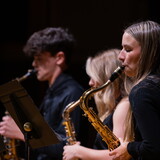Aaron Miller was only six-years-old when music started to play an important role in his life. He sang in his family church choir. He sang in high school.
And then he started writing.
“I was in a rock band,” Miller recalled of his high school days. “I was bad at writing lyrics, but I could write music. When I got to college and I had to learn about music theory, I got a deeper interest in writing choral music.”
Miller, a senior music education major, has premiered four choral pieces during his Nebraska Wesleyan career, including a piece that was performed on the University Choir’s three-state tour in January.
Last spring he wrote “Vinea Mea Electa,” following a University Choir performance during Holy Week.
“One of the pieces I heard was entitled “Vinea Mea Electa” by Francis Poulenc, which is also the title of my piece,” said Miller. “I was drawn to the text for a number of reasons, particularly because it is a Good Friday text from the perspective of the crucifixion of Jesus Christ.”
“It seemed to speak to a more human nature of Jesus, which I never really encounter in many other things,” he added. “I felt dissatisfied by how the piece ended so I decided to write my own version to put my spin on the interpretation of the text.”
When he finished, he asked William Wyman, professor of music and University Choir director, to consider having the University Choir perform it. He waited all summer for Wyman’s response.
“When Dr. Wyman told me he would do my piece, I was thrilled,” he said.
“People are always emailing me asking me to consider their pieces,” said Wyman. “But when it comes to a student, it only makes sense that a young composer and member of the choir who writes a piece that has merit, ought to get a chance to get it heard.”
Miller’s composition is challenging from both a technical and interpretation perspective.
“If I have to take a portion of a touring concert and dedicate it to a seven-minute-long song like Aaron’s, I have to be satisfied with the piece,” said Wyman. “It has to showcase the skills and qualities of the composer and also serve as a good training for my students.”
With its use of compositional practices including close harmonies and range extremes on a very dark text, Miller’s piece is “a challenging one especially for young singers, but they can grow thanks to that,” said Wyman. “It is a hard piece to listen to for the audience, but also for the students who sing it. Being able to convey the tone of the text through sincere emotion and the skills required on a technical music level is a challenge.”
Miller wrote “Vinea Mea Electa” on music notation software called Finale.
“It is useful because I can hear immediately what I compose,” he said.
But that did not prepare him for hearing his work live.
“When I heard real human voices sing it, it was everything and nothing I had imagined at once,” he recalled.
Miller did not expect the opportunity to become a composer as an undergraduate.
“I was shocked at how wrong I was. All of the choirs here have leaders more than willing to hear what students have to offer and even perform them even,” he said. “I’m grateful for all of the opportunities I have been given on this campus and the grace of the directors in giving them to me.”
Following his graduation in May, Miller hopes to become an elementary music teacher.
In the meantime, he encourages students to take an active role in their education.
“For students who want to be composers, the best thing to do is to compose and show your work to your professors,” Miller said. “They will give you their honest feedback, and even if they don’t accept the piece, it will help you grow. The best thing that could happen is that they accept it. The worst that could happen is that they help you.”
###
Story by Alessandro Schirano, public relations intern.








